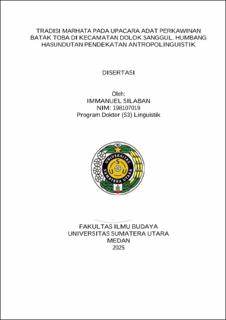| dc.description.abstract | Marhata is an oral tradition of the Batak Toba. It is a dialogue between a bride's parents and a groom's ones, preceded by having a relaxed meal. In order to analyze marhata oral tradition in the Batak Toba's traditional wedding ceremony by using anthropolinguistic parameter approach such as connectedness, valuableness, and sustainability. The objective of this research is to formulate the pattern of linguistic performance of marhata tradition, to find the local wisdom of marhata tradition, and to formulate the pattern of marhata traditional revitalization in the Batak Toba's traditional wedding ceremony so that it can be conserved and bequeathed to the young generation. The research uses ethnographic approach suggested by Spradley. The data are collected by conducting observation and interview. Primary data are obtained from the result of observation in the research location where marhata traditional ceremony is held. The findings of the performance pattern are the structure of marhata performance, the principle of marhata tradition, and the formula of marhata tradition. The findings of the local wisdom in marhata explain the meaning, function, value, and norms found in it. The result of the research shows that marhata performance is the performance of negotiation which consists of persuasive and declarative expressions. The meaning of marhata in the Batak Toba community is conveying messages or intention of families concerning the process of wedding which will be held by both families. Revitalization model consists of two programs: short term program and long term program. In the short term, marhata training is revitalized so that it will exist/be maintained. In the long term, marhata will be documented with audio-video and it will be filed in the form of digital and books. Moreover, cadre formation of marhata doers is done by parhata for young generation by bequeathing oral tradition in the Batak Toba's young generation in Humbang Hasundutan Regency. | en_US |


